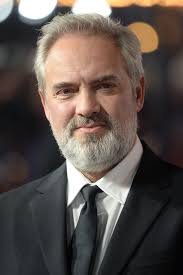
Sam Mendes (born August 1, 1965) is a British film director, producer, and screenwriter, renowned for his work in both film and theater. Mendes is recognized for his visually stunning films, complex narratives, and focus on character development. His diverse body of work spans across different genres, from dramas to thrillers, often exploring themes of human nature, identity, and personal conflict.
Early Life and Education:
Sam Mendes was born in Reading, Berkshire, England, to a theatrical family. His father, Peter Mendes, was a publisher, and his mother, Valerie Mendes, was a writer. Mendes’ grandfather was the actor and playwright Sir David Markham.
Mendes attended Magdalen College at the University of Oxford, where he studied English literature. During his time at Oxford, he became involved in theater and made his directorial debut with several plays. He graduated with a degree in English literature and quickly established himself as a talented theater director.
Theater Career:
Mendes began his directing career in the theater, where he earned a reputation for his work with the Royal Shakespeare Company and The Donmar Warehouse, a prestigious theater in London. He became the artistic director of the Donmar Warehouse in 1992, and his success in the theater world eventually led to his transition to film.
In theater, Mendes directed highly acclaimed productions, including:
- “The Cherry Orchard” (1995)
- “Twelfth Night” (1996)
- “Cabaret” (1998) – A revival of the classic musical, which won several Tony Awards.
His work with “Cabaret” was particularly well-received, earning him the Tony Award for Best Direction of a Musical in 1999.
Film Career:
“American Beauty” (1999):
Mendes made his feature film debut with the critically acclaimed “American Beauty” (1999), a drama about the disillusionment and crisis of a middle-aged man (played by Kevin Spacey) in suburban America. The film was a massive success, both commercially and critically. It won five Academy Awards, including:
- Best Picture
- Best Director (Sam Mendes)
- Best Actor (Kevin Spacey)
- Best Original Screenplay (Alan Ball)
Mendes’ direction in “American Beauty” was praised for its dark humor, visual style, and exploration of the complexities of American life. The film became one of the most iconic films of the late 1990s.
“Road to Perdition” (2002):
Mendes followed “American Beauty” with “Road to Perdition” (2002), a period crime drama starring Tom Hanks and Paul Newman. The film explores themes of family loyalty, crime, and redemption during the Great Depression. Mendes’ use of cinematography by Conrad L. Hall and his ability to craft a tense, visually rich narrative earned widespread praise. The film was nominated for six Academy Awards, and Conrad L. Hall won the Oscar for Best Cinematography.
“Jarhead” (2005):
Mendes directed “Jarhead” (2005), a war drama based on the memoir of a U.S. Marine during the Gulf War, starring Jake Gyllenhaal. The film explores the psychological toll of war and the experience of soldiers who spend long periods in the desert, waiting for combat that never materializes. The film received generally positive reviews for its striking visuals and thought-provoking take on the futility and psychological effects of war.
“Revolutionary Road” (2008):
Mendes returned to themes of suburban dissatisfaction with “Revolutionary Road” (2008), starring Leonardo DiCaprio and Kate Winslet. The film, adapted from Richard Yates’ novel, follows a young couple who are struggling to break free from the confines of suburban life. Mendes’ direction was praised for its intimate portrayal of domestic tension, and both DiCaprio and Winslet received acclaim for their performances. The film was nominated for three Academy Awards.
“Skyfall” (2012):
Mendes directed “Skyfall” (2012), the 23rd James Bond film, starring Daniel Craig as 007. This film marked a return to Bond’s roots, blending action with emotional depth, and it was widely praised for Mendes’ direction. “Skyfall” became the highest-grossing Bond film at the time and won two Academy Awards:
- Best Original Song for Adele’s “Skyfall”
- Best Sound Editing (Mark Taylor, Scott Millan)
Mendes’ approach to Bond revitalized the series, and “Skyfall” is regarded as one of the best entries in the franchise.
“1917” (2019):
One of Mendes’ most acclaimed works is “1917” (2019), a World War I drama shot to appear as if it was filmed in a single continuous take. The film follows two British soldiers tasked with delivering a crucial message to prevent an attack. “1917” was a massive success, both critically and commercially, and won several major awards:
- Best Director (Sam Mendes) at the Academy Awards
- Best Cinematography (Roger Deakins) at the Academy Awards
- Best Motion Picture – Drama (Golden Globe)
- Best Director (Golden Globe)
The film was praised for its immersive storytelling, technical achievements, and the performances of its leads, George MacKay and Dean-Charles Chapman. Mendes’ innovative approach to the film’s visual style earned him widespread acclaim.
Other Notable Works:
- “Away We Go” (2009): A comedy-drama about a couple traveling across the United States as they prepare for parenthood. The film was a departure from Mendes’ darker work but was praised for its warmth and charm.
- “The Lost City of Z” (2016): A biographical adventure film about British explorer Percy Fawcett (played by Charlie Hunnam), Mendes directed the film to critical acclaim. It explores Fawcett’s obsession with finding an ancient lost city in the Amazon rainforest.
Awards and Recognition:
Sam Mendes has won numerous awards throughout his career, including:
- Academy Awards:
- Best Director for “American Beauty” (1999)
- Best Director for “1917” (2019)
- Best Cinematography for “1917” (2019)
- Best Original Song for “Skyfall” (2012)
- Golden Globe Awards:
- Best Motion Picture – Drama for “American Beauty” (1999)
- Best Director for “American Beauty” (1999)
- Best Motion Picture – Drama for “1917” (2019)
- Best Director for “1917” (2019)
- BAFTA Awards:
- Best Director for “American Beauty” (1999)
- Best Film for “American Beauty” (1999)
- Best Director for “1917” (2020)
- Critics’ Choice Movie Awards:
- Best Director for “1917” (2019)
- Tony Awards:
- Best Director of a Musical for “Cabaret” (1999)
Style and Themes:
Mendes’ films often explore themes of identity, human connection, disillusionment, and the emotional toll of personal conflict. His works range from intimate dramas to epic war films, but they all share a deep concern with the internal struggles of his characters.
Visually, Mendes is known for his meticulous attention to detail and use of striking cinematography. His collaborations with cinematographers like Conrad L. Hall (on “Road to Perdition”) and Roger Deakins (on “1917”) have produced some of the most memorable and visually stunning films in modern cinema.
SOCIAL MEDIA LINKS:
YOUTUBE : https://www.youtube.com/watch?v=KLiEp10QZmE&pp=ygUUU2FtIE1lbmRlcyBJTlRFUlZJRVc%3D
INSTAGRAM : https://www.instagram.com/sam.mendes_official/?hl=en




